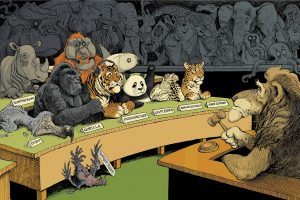Ehsan Masood in Nature:
 It’s a hot and humid afternoon in the suburbs of Washington DC, and Bob Watson is looking worried. The renowned atmospheric chemist sits back on a bench in his yard, hemmed in by piles of paperwork. He speaks with his characteristic rapid-fire delivery as he explains the tensions surrounding the international committee he helms. The panel is supposed to provide scientific advice on one of the world’s most intractable problems — the rapidly accelerating loss of plants and animals. But a rift in the research community risks diminishing the whole effort. In a few days’ time, Watson will fly to England to mark his seventieth birthday, but right now he is not in a celebratory mood.
It’s a hot and humid afternoon in the suburbs of Washington DC, and Bob Watson is looking worried. The renowned atmospheric chemist sits back on a bench in his yard, hemmed in by piles of paperwork. He speaks with his characteristic rapid-fire delivery as he explains the tensions surrounding the international committee he helms. The panel is supposed to provide scientific advice on one of the world’s most intractable problems — the rapidly accelerating loss of plants and animals. But a rift in the research community risks diminishing the whole effort. In a few days’ time, Watson will fly to England to mark his seventieth birthday, but right now he is not in a celebratory mood.
Watson is talking about a conflict infecting the Intergovernmental Science-Policy Platform on Biodiversity and Ecosystem Services (IPBES), a younger sibling to the Nobel-prizewinning Intergovernmental Panel on Climate Change (IPCC). Both have immense tasks. The IPCC provides timely, expert information on climate change, and it helped to lay the groundwork for international treaties aimed at slowing global warming, such as the 2015 Paris climate accord. The biodiversity panel has been tasked to focus on the epic disappearance of plant and animal populations. As with climate change, humans are the main culprit in biodiversity loss. People have converted somewhere in the region of 50% of Earth’s surface for human activities, and researchers warn that the resulting loss of animal and plant species is leading towards a mass extinction.
More here.
